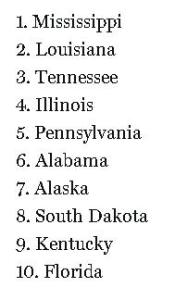A story in Fortune reports that government corruption at the state level is very costly.
…corruption is everywhere, in one form or another. And it’s costing U.S. citizens big time. A new study from researchers at the University of Hong Kong and Indiana University estimates that corruption on the state level is costing Americans in the 10 most corrupt states an average of $1,308 per year… The researchers studied more than 25,000 convictions of public officials for violation of federal corruption laws between 1976 and 2008 as well as patterns in state spending to develop a corruption index that estimates the most and least corrupt states in the union.
 Here’s the list of the 10-most corrupt states. At first glance, there doesn’t seem to be a pattern.
Here’s the list of the 10-most corrupt states. At first glance, there doesn’t seem to be a pattern.
Southern states are over-represented, it appears, but that’s obviously not an overwhelming factor since Georgia, South Carolina, Arkansas, and Texas (among others) didn’t make the list.
But it turns out that there is a factor that seems to be very prevalent among corrupt states.
The researchers also found that for 9 out of the 10 of the most corrupt states, overall state spending was higher than in less corrupt states (South Dakota was the only exception).
The authors suggest an attack on corruption could lead to a lower burden of government spending.
Attacking corruption, the researchers argue, could be a good way to bring down state spending.
I don’t disagree, but I wonder whether there’s an even more obvious lesson. Maybe the primary causality goes the other direction. Perhaps the goal should be to lower state spending as a way of reducing corruption.
Returning to the analogy I used earlier, a smaller dumpster presumably means fewer rats and roaches.
That’s not the only interesting data from the study. Fortune also reports that infrastructure projects and bloated bureaucracies are linked to corruption.
The paper explains that construction spending, especially on big infrastructure projects, is particularly susceptible to corruption… Corrupt states also tend to, for obvious reasons, simply have more and better paid public servants, including police and correctional officers.
I’m not surprised by those findings. Indeed, I would even argue that a large bureaucracy, in and of itself, is a sign of corruption since it suggestsfeatherbedding and patronage for insiders.
For more info on the size of government and corruption, here’s a CF&P video I narrated. It’s several years old, but the message is even more relevant today since the public sector is larger and more intrusive.
